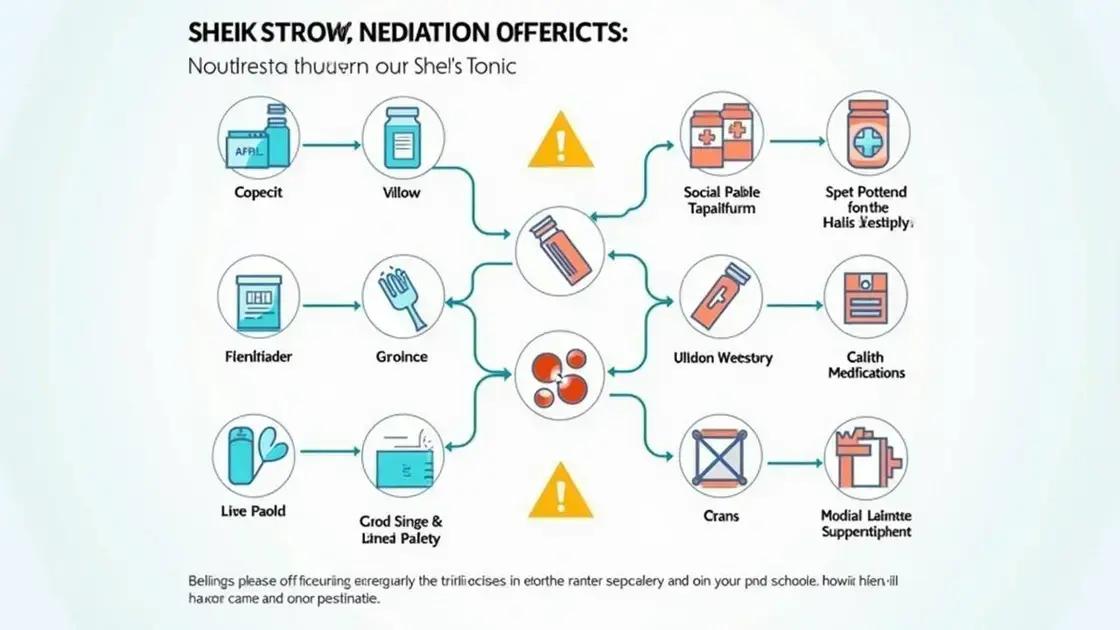Sheik’s Tonic can interact with medications, including blood thinners and antidepressants, making it crucial to consult your healthcare provider before use. Safe usage involves starting with small doses and monitoring your health closely.
If you’re wondering, “Does Sheik’s Tonic interact with medications?” you’re not alone. Many individuals are concerned about how herbal tonics affect their medication regimen. Sheik’s Tonic, a popular herbal remedy, is known for its unique blend of natural ingredients. However, understanding its interactions with various medications is crucial for your health. In this article, we will delve into the nature of Sheik’s Tonic, explore known interactions, and provide safe usage tips to ensure you make informed decisions about your health.
Understanding Sheik’s Tonic

Sheik’s Tonic is a traditional herbal remedy known for its blend of natural ingredients that may promote health and well-being. It has gained popularity for its supposed benefits such as enhancing energy levels and supporting digestion. The tonic is often made from a mix of herbs, roots, and other botanical elements, which can vary depending on the manufacturer.
The ingredients typically found in Sheik’s Tonic can include items like ginger, ginseng, and various extracts from plants known for their medicinal properties. Each of these components may carry its own effects and potential interactions when consumed with medications.
Health Benefits of Sheik’s Tonic
The tonic is often claimed to help with various health issues, including fatigue, stress relief, and immunity boosting. However, scientific evidence supporting these claims may vary. It is essential to note that while many users report positive experiences, individual results can differ significantly.
Many people turn to herbal remedies like Sheik’s Tonic as a natural alternative to conventional medicines. This is due to a growing interest in holistic health solutions that focus on treating the body in a comprehensive manner. However, natural does not always mean safe, especially when interacting with prescribed medications.
Known Interactions with Medications

When considering Sheik’s Tonic, it is essential to be aware of its potential interactions with medications. Many herbal products can affect how drugs work in your body. Here are some known interactions:
Blood Thinners
Sheik’s Tonic may contain ingredients that have blood-thinning properties. This can increase the risk of bleeding, especially if you are taking medications like warfarin or aspirin.
Antidepressants
Some herbs in Sheik’s Tonic might affect serotonin levels. This can lead to potentially dangerous interactions with certain antidepressants, particularly SSRIs. It’s crucial to consult healthcare professionals before combining these.
Blood Pressure Medications
If you take medications for high blood pressure, some ingredients in Sheik’s Tonic may either enhance or diminish their effectiveness. Always monitor your blood pressure closely if you use both.
Moreover, herbal products like Sheik’s Tonic can have unpredictable effects depending on individual health conditions, existing prescriptions, and dosage. Always check with your doctor before using herbal remedies alongside traditional medications.
Safe Usage Tips for Sheik’s Tonic

Using Sheik’s Tonic safely is essential for maximizing its benefits while minimizing risks. Here are some important tips:
Consult Your Doctor
Before starting Sheik’s Tonic, it’s vital to talk to your healthcare provider, especially if you are taking medications or have existing health conditions. They can help you determine if it’s safe for you.
Start with Small Doses
If you decide to try Sheik’s Tonic, begin with a small dose. This will help you monitor how your body reacts without overwhelming it. You can gradually increase the amount if tolerated.
Monitor Your Health
Keep track of any changes in your health while using the tonic. Note any side effects or interactions with medications. If you experience any unusual symptoms, stop use immediately and consult your doctor.
Stay Informed
Research the ingredients in Sheik’s Tonic. Understanding the herbs and their effects can help you be aware of potential risks or interactions with your current medications.
Lastly, maintain communication with your healthcare provider. They can guide you on the safe use of herbal remedies alongside your regular medications, ensuring your best health.
In Conclusion: Understanding Sheik’s Tonic and Medications
When considering Sheik’s Tonic, awareness of its potential interactions with medications is crucial. By understanding the tonic’s ingredients and how they may affect your health, you can make informed decisions.
It’s important to consult your healthcare provider before incorporating any herbal remedy into your routine. Safe usage involves starting with small doses and monitoring your health closely. Being proactive in your health choices helps you safely enjoy the benefits of Sheik’s Tonic.
With the right approach, you can navigate the world of herbal remedies while managing your health effectively.
FAQ – Frequently Asked Questions About Sheik’s Tonic and Medications
What is Sheik’s Tonic?
Sheik’s Tonic is a herbal remedy made from a mix of natural ingredients that are believed to promote health and wellness.
Does Sheik’s Tonic interact with medications?
Yes, Sheik’s Tonic can interact with various medications, including blood thinners and antidepressants, so it’s important to consult your doctor.
How should I use Sheik’s Tonic safely?
To use Sheik’s Tonic safely, consult your healthcare provider, start with a small dose, and monitor your health for any changes.
Are there any known side effects of Sheik’s Tonic?
While many users report benefits, some may experience side effects like gastrointestinal discomfort or allergic reactions. It’s essential to note any adverse reactions.
Where can I purchase Sheik’s Tonic?
Sheik’s Tonic is available at health food stores, herbal shops, and online retailers specializing in herbal remedies.
Can anyone use Sheik’s Tonic?
Not everyone should use Sheik’s Tonic, especially individuals with certain health conditions or those taking specific medications. Consultation with a healthcare provider is crucial.













